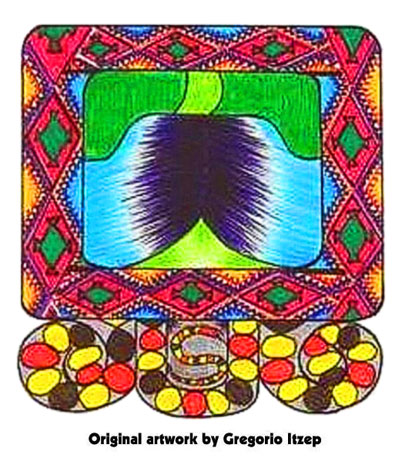
CibTrecena
by Kenneth Johnson
The Yucatec word cib literally means “wax,” and the Book of Chilam Balam of Chumayel tells us that upon this day God lit the first candle; the first light was made to shine in the darkness. Though candles are an important part of contemporary Mayan ritual, there were no candles in pre-Columbian days; the passage in the Chumayel dates from after the Spanish Conquest, and candles are an adaptation to Christian ways rather than a custom surviving from antiquity.
Nevertheless, the association between wax and the day known as Cib (or Vulture in the Aztec calendar), is ancient indeed. The wax symbolized by Cib in pre-Columbian times was beeswax. The Yucatec Maya recognized four divine figures who held up the four corners of the world— another variation on that all-important symbol, the four directions of time. They were called the Bacabs, and their appearance was that of four gigantic bees. On their heads they wore conch shells—the ideogram associated with the day-sign Cib. The conch shell symbolized emergence and rebirth because of its spiral shape; like the spirals of Anasazi and Hopi art, it told the story of humankind’s emergence from earlier worlds as well as defining the whole process of death and rebirth which takes place eternally within the human soul.
The conch is also linked with the Underworld, the place from which the human race ultimately emerged and the place to which we must return if we are to experience the death and rebirth process. According to the Maya, the spirits of the departed may sometimes return as butterflies or bees. (I have seen butterflies appear in flocks many times during Mayan ceremonies.)
While the K’iche’ word for this day, ajmaq, can literally mean “sinner,” this day-sign is more often said to refer to the forgiveness rather than the commission of misdeeds. Ajmaq, above all other signs, is symbolic of “karmic clean-out.”
The Aztecs—and probably the Toltecs before them—placed great emphasis on the confession of sins. It was believed that when a man confessed, his sins were “eaten” by Tlazolteotl, the goddess of sex and magic. This fierce goddess—reminiscent of the destructive female deities of Hindu or Buddhist Tantra—was the patroness of witches and sorcerers and her sexuality was a rampant, uncontrolled force. It was to her that dying Aztecs confessed their sins—their karma (or filth) was consumed (eaten) by the goddess, who thereby redeemed them. Thus the Aztecs paid homage to the transforming power of darkness—even as the similar Hindu goddess Durga Kali may ultimately be made manifest not as the horrible dancer decorated with skulls but as the beautiful, divine mother of the universe. This is the day-sign in which the remnants of our karmic patterns are purged and cleared away.
Cib is also related to the myth of 7 Macaw, a character in the Pop Wuj who exemplifies the Seven Wrongful Behaviors. The macaw bird was perched on top of the tree which stood at the center of the universe, the world tree that forms the axis of all being. From his lofty vantage point, looking down upon the world below him, he began to assume that he was God. But he was mistaken. Only Ahau is God. The macaw was deluded by pride, ambition, and ignorance. The gods sent the Hero Twins to dislodge him from his perch, causing him to see that, in reality, he was only a silly bird.
It is said that the first human beings could see all things clearly. Their perception was so extraordinary that they were like the gods themselves. And yet human beings had been created to sing out with song and poetry in praise of the gods – not to challenge them by setting themselves at the same level. Thus the gods created “misbehavior” or maq, a curtain of smoke that hides us from the presence of Ahau. If we were able to clean the mirror, we would see the world as the gods see it. Instead, we are mortal. We are human. We must be grateful for each moment of clear perception that allows us to see the world through the eyes of gods, the world as it truly is.
This is in part a day of the Otherworld. It is good to remember friends and family members who have passed away from us, and to light a candle or two in their memory at this time. If there is anything for which you seek forgiveness, this is the time to ask for it; the ancestors are listening, and incline themselves favorably to our affairs.
http://www.jaguarwisdom.org

